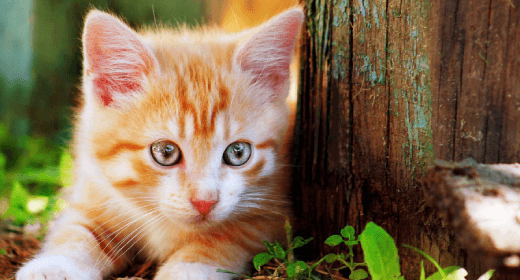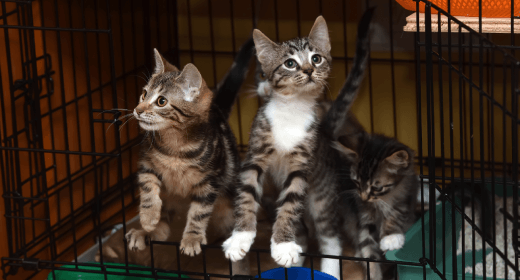

Every kitten food has protein, but here are some important facts about the different types of protein to help you choose the right food for your kitten. It is impor¬tant to remember that the source of protein is vitally important to kittens because one of the principle nutritional philosophies is that kittens are best fed as carnivores.
Some pertinent facts when listening to the claims and advertising of various manufacturers:
1. Recommended kitten food protein levels are established by nutrition experts from around the world and published as NRCs (Nutrient Reference Charts). These protein requirement levels are determined by meeting the animal’s need for essential amino acids, the building blocks of protein; and by monitoring/calculating the nitrogen balance (a comparison between the intake of nitrogen in the diet and the losses through urine, feces, and evaporation from the skin and mouth). Nitrogen balance has been the recognized method of determining protein requirements for many decades. Variations in levels from what has been established for many years should be validated by convincing research. If the change in level isn’t backed by sup¬porting evidence of a tangible benefit, then there may be hazards. Studies in several species have found a link between diets with high protein levels (greater than 40% protein), bone loss, and urinary tract stones.
2. Protein from plant sources may elevate the amount of protein, but may not be as beneficial as animal-based sources of protein in kitten food because of lower digestibility, effects on muscle-to-fat body composi¬tion ratio, and the range of amino acids they provide.
3. There are only three sources of energy in any kitten food diet–fat, protein, and carbohydrate (starch). If the amount of one element is raised, the amount of one or two of the others must be lowered to maintain a proper energy level in the food for your kitten’s life stage and life¬style. A balance of nutrients is important to your kitten because each of the nutrient groups supplies something very specific for the kitten’s body. Excess protein above your kitten’s actual needs cannot be stored for future use and will be converted into fat.


Adopting a cat can see you develop one of the most beautiful bonds of your life as you connect with your feline friend. Cats are playful creatures who can be very affectionate and form a strong relationship with you. Every time you play with your cat or simply spend time with them, you may notice a significant drop in stress levels and experience a boost of happiness. However, it is important to remember that cat adoption is a big decision which comes with a lot of responsibilities. Your home will become the cat’s home and you become their family. To ensure they get the best possible future with you, there are a few things that you need to understand before proceeding with cat adoption.
Whether you are opting to adopt a kitten or a grown cat, here are some things you need to consider before going through with the entire process.
Adoption is a permanent duty and a bond that lasts for a lifetime. When you bring home a rescued cat or adopt one from a shelter, you are providing the animal with new hope. The cat will be a member of your family and you will need to treat them as such. The lifespan of cats generally ranges from 12 to 20 years, and this is how long your commitment will be. Only once you have considered the enormity of your decision and are ready for it, should you go through with cat or kitten adoption.
Before you bring home an adopted or a rescued cat, you will need to make a few changes in your house to create favourable conditions for them. You can begin by doing the following:
Cover up exposed electrical wires in a way that the cat can’t reach them (since they might try to chew up the wire, which can lead to a severe accident).
Prepare your kids and teach them the basics of being responsible around a cat.
Keep a special room or space for the cat, so they can feel safe and get a sense of belonging.
Find a vet near your area where you can take the rescued cat for regular check-ups.
Adopting a cat also has many benefits such as:
If you adopt a cat instead of buying one, you will be helping a cat in need. You will be giving a rescued cat much-needed shelter, their own space, and a family that loves them.
One of the biggest benefits of adopting a cat from a shelter is that they often have an already established personality. This makes it easier for people to adopt a cat that best suits their lifestyle.
When adopting a cat, here are a few factors you should keep in mind:
If you have other cats at home, you will need to adopt a cat that likes their company. You can talk to the shelter home about this, so they direct you to cats who bond well with other cats.
When you adopt a cat, you should be able to make time for them and give them proper care and attention. You can also consider adopting a cat whose lifestyle matches yours. For instance, a cat who likes being independent can be a perfect choice for someone who is often busy.
To give your cat the best life, ensure that you have all of the following essentials: